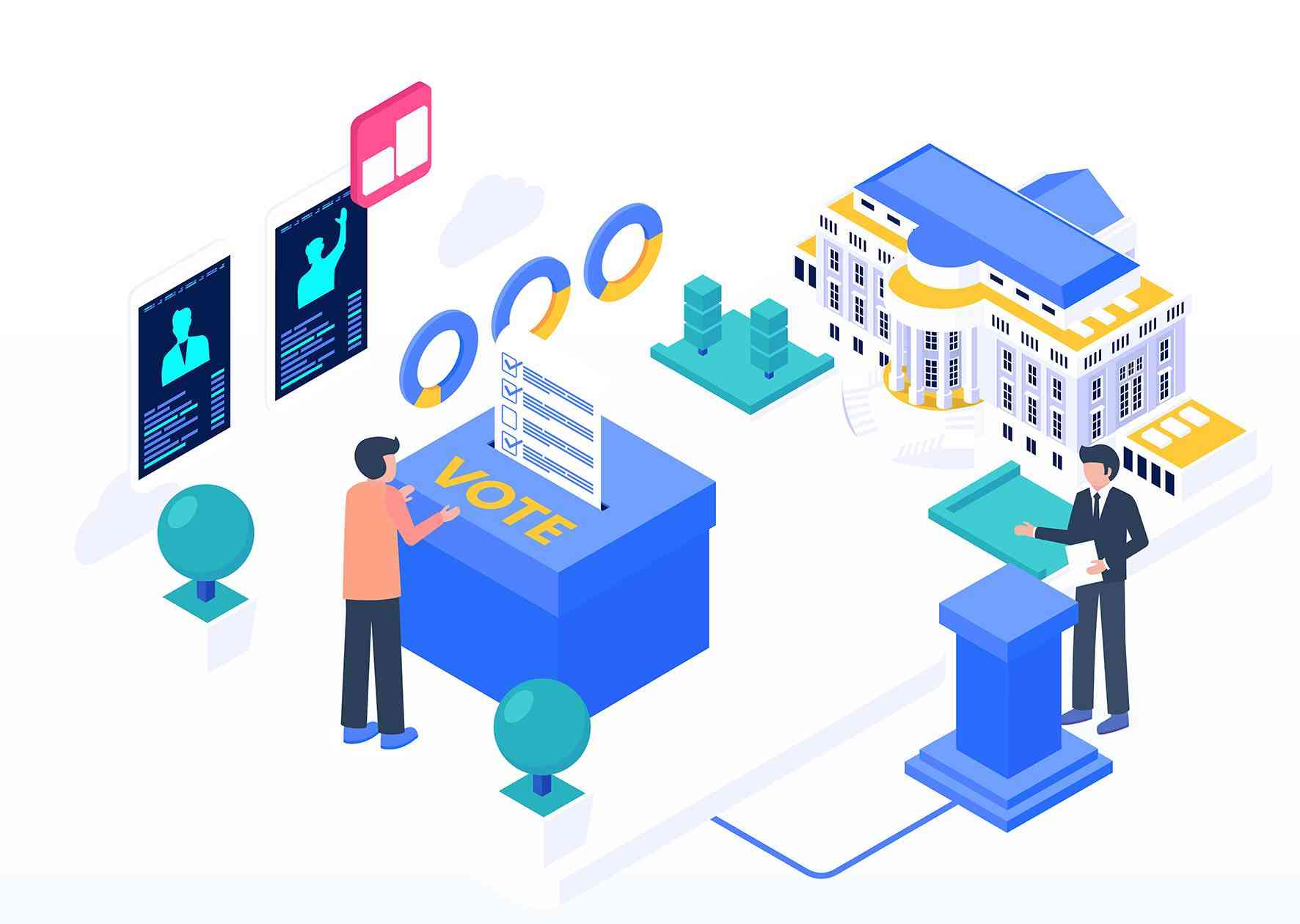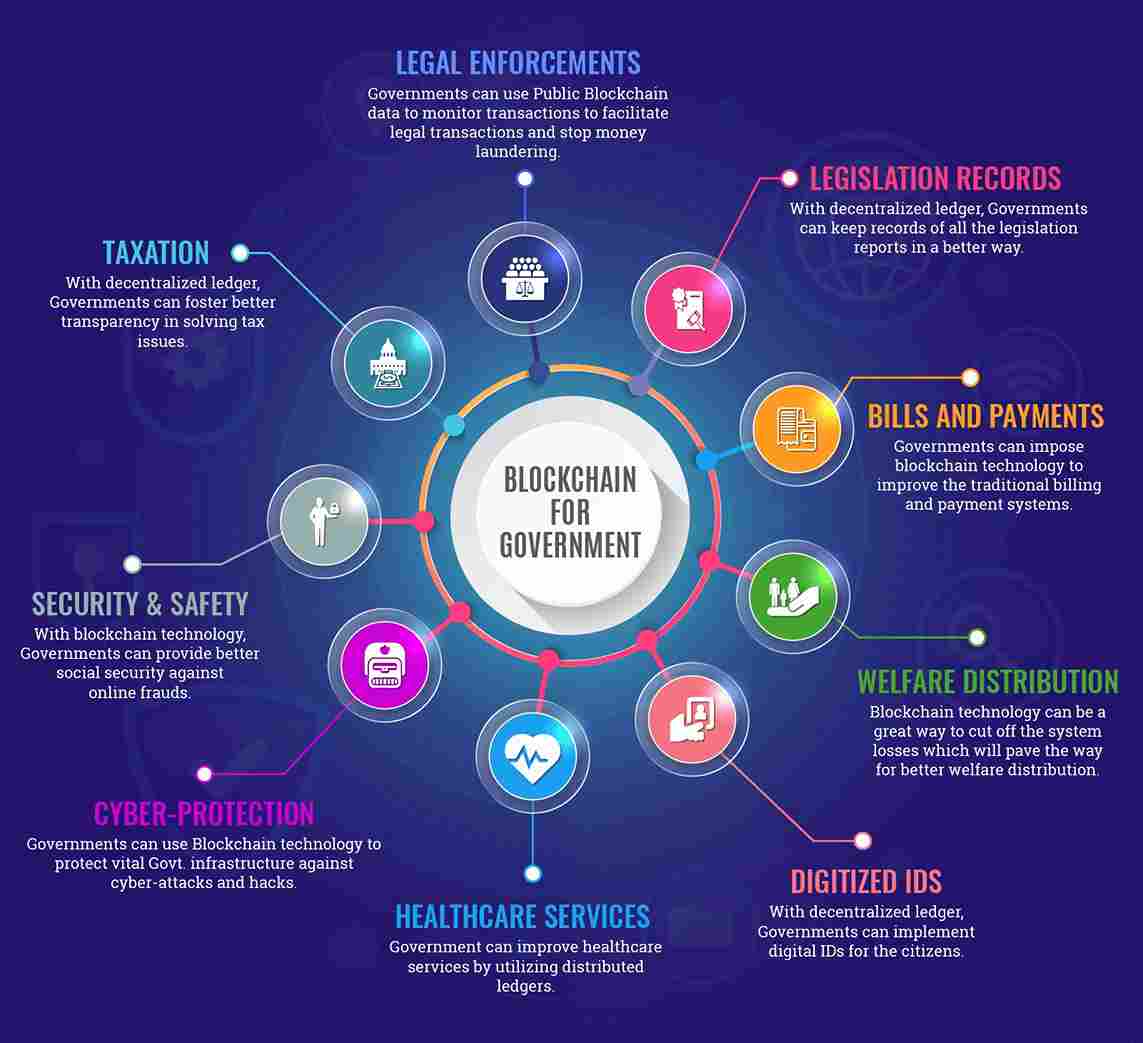Blockchain is not just for crypto fans. Did you ever ask yourself, how will governments use blockchain in the future? They’re already eyeing this tech to transform how they work. In this article, I’ll guide you through the nooks and crannies of the blockchain revolution for governments. Imagine cutting the red tape with one click or securing your vote on an unhackable platform. We’ll explore the surefire ways officials plan to bring services into the digital age. With blockchain, they aim to make tax collection a breeze and public records a fortress of trust. And that’s just the tip of the iceberg. From procurement to healthcare, watch out for the blockchain shake-up. Let’s take a deep dive into this journey of blockchain and bureaucracy. Buckle up; we’re about to ride into a future with smarter governance at the helm.
Leveraging Blockchain for Enhanced E-Governance
Digital Identity and Citizen Services
Governments worldwide are always looking for ways to better serve you. They want systems that are easy, fast, and safe. Imagine not waiting in long lines or filling out piles of forms. Future tech, like blockchain, can make this real.
You might ask, “What’s blockchain?” Picture a digital book where every page is a record that can’t be erased. Each page tells a story of a deal, a promise, or an identity. This book is open for everyone to see, but only you can use your page.
Now, think of all the times you need to prove who you are. Getting a passport, voting, or even opening a bank account all need solid proof. With blockchain, your ID is safe and sound in one place. You can use it anytime, without fear of someone stealing your details. This means less worry for you and less fraud for everyone.
Blockchain also speeds up getting what you need from government. Say you want to fix your street’s lights. A smart contract can make this happen smoothly. It’s like a deal that does itself when both sides say “yes.” The light gets fixed, and the worker gets paid. Simple and quick, with nobody messing around in the middle.
Transparent and Trustworthy Public Recordkeeping
Trust is a big deal when it comes to records and the government. You want to know the truth about things like land ownership. Blockchain can help here, too.
How does it make things better? With blockchain, records are out in the open. Every change is there for you to see. No more secrets or lost files. This means trust goes up. Imagine buying a house with less worry because every detail is crystal clear.
Public records on blockchain also mean easier access for you. Instead of digging through old files, you get the info with just a few clicks. Plus, it’s super secure. Your personal stuff and important papers stay safe.
When talking about blockchain in the future for governments, remember these things. It makes proving who you are safer and simpler. Deals and promises between you and government get easier and faster. And all the important records? They’re trustworthy, clear, and secure.
Governments have a lot of work to do. But with blockchain, they can do it better, for you and for everyone. Keep an eye out! Soon, you might be living in a world where waiting in line at the government office is just a bad memory.
Revolutionizing Administrative Efficiency
Optimizing Tax Collection with Blockchain
Taxes pay for schools and roads. But collecting taxes isn’t easy. Now, meet blockchain. It’s a tool that can track every penny online with no cheating. This means people pay what they owe and the government knows it. It’s like having a super-smart calculator that also tells the truth.
Governments get smarter with blockchain. They see who pays taxes and who does not. No one can trick the system. It’s all clear and fair. Everyone does their part and our towns get better. Cool, right?
Smart Contracts in Public Procurement and Healthcare
Say you want new swings in the park. The town pays people to build them. But how can we know the right people get the job? With blockchain, we can. It’s a list everyone can see but no one can mess with. It picks the best builders for the best price.
Now think about going to the doctor. It can take a long time and be confusing. With blockchain, things can get easier. Your records are safe and your visits are quick. No mix-ups, no lost forms. Just you, the doctor, and care that’s fast and right.
That’s our future with blockchain. It’s more than computers talking. It’s about our streets getting fixed without waiting too long. It’s about feeling good that our systems work for us. It’s smart and it’s something to be excited about.
Secure and Verifiable Voting Systems
Blockchain Voting: Safeguarding Electoral Integrity
We sure need voting to be honest and safe. Imagine a world where every vote is a block on a chain that no one can break or fake. That’s what blockchain can do. As someone who digs deep into blockchain in government, let me spread the word. It can keep our votes safe.
Now, putting votes on blockchain, that’s smart. Why? Because once a vote goes in, it stays put. No sneaky moves, no mess-ups. This means when you vote, it’s like locking it in a safe. That feels good, right?
But there’s more than just feeling safe. The whole world could change how elections work. If all countries use blockchain, every vote counts and is clear to see. No doubts, no “maybe this” or “maybe that”. Just clear, straight-up votes.
Cross-Domain Government Collaboration
Sharing is caring, right? Well, governments think so too. They want to share data easy and fast. Blockchain is like a bridge for info, crossing over seas and lands with no sweat.
Let’s get this straight. When agencies share data, they can make better rules that help us all. Plus, with blockchain, they can do this without worry. It’s like having a chat with a pal across the world, but for big government decisions.
So, here’s the scoop. Blockchain is not just about money and techy stuff. It’s about making things run smooth. It’s about trust. And I’ll tell you, trust is what we need for a future that rocks.
Planning for the Blockchain Future in Government IT
Decentralizing Government Operations
Let’s talk about how governments can work better. Imagine a system where every part works on its own but still follows the rules. That’s what blockchain can do for government services. It spreads out the work and cuts out waiting. This way, services get to you faster and easier.
Governments are also looking at new types of money, like digital money, that a country creates. This kind of money lives on the blockchain. It’s safe and easy to keep track of. Central banks are thinking about using it, making money matters clear and easy for everyone.
Asset Management and Cost Efficiency
Governments have a lot of things to take care of. They own buildings, land, and all sorts of stuff. To manage all that well, they need a good plan. Blockchain helps by keeping track of everything in one place. This makes sure nothing gets lost and everything is used right.
When governments use blockchain, they can save money. It helps them do things in a smart way that costs less. This means they can put more money into helping people. Services get better because the government doesn’t waste money where it doesn’t need to.
By using blockchain, governments can make their work simpler and clearer. This change helps everyone and makes life better.
We’ve explored how blockchain can transform e-governance: from boosting secure identity verification to improving the way we vote. This tech makes government records transparent and trustable. It makes tax systems fair and fights fraud.
Blockchain tech can cut red tape, crush corruption, and make healthcare services super smooth. It links governments together for smart teamwork and policymaking that jumps borders with ease.
Our final takeaway? Blockchain is not just a tech trend. It’s a powerful tool that will redefine how governments work. It’s all about clear services, safe records, and smart planning. It promises a future where trust in public service is as solid as the tech itself. Let’s get ready for that future now!
Q&A :
How can blockchain technology benefit government operations?
Blockchain technology offers numerous benefits for government operations, including enhanced security, transparency, and efficiency. Governments can use blockchain to secure sensitive data, streamline bureaucratic processes, and reduce fraud. With a decentralized ledger, blockchain can help in record-keeping for land registries, identification systems, and public voting methods, further ensuring the integrity of the data logged.
What are the potential uses of blockchain in future public sector applications?
The public sector might see a wide array of blockchain applications in the future. These include management of supply chains to track the authenticity of goods, secure sharing of medical records, management of intellectual property, and perhaps most notably, implementation of e-voting systems to ensure fair and verifiable elections. Other prospective uses may involve managing grants and public funds to enhance transparency and accountability.
How will blockchain change the future of public service delivery?
Blockchain is poised to revolutionize public service delivery by making it more efficient, secure, and user-friendly. For instance, it could allow for the seamless distribution of benefits or services without intermediary delays or bureaucratic red tape. Patients could have immediate access to their health records across borders without compromising privacy. Additionally, blockchain can enable smart contracts that automatically execute when predefined conditions are met, speeding up numerous public services.
Can blockchain help in tax collection and administration for governments?
Yes, blockchain has the potential to greatly enhance tax collection and administration. By utilizing blockchain, governments can streamline the recording of transactions, minimize errors and fraud, and ensure the integrity and traceability of tax-related documentation. This can lead to more efficient tax collection processes, improved compliance, and reduced costs associated with tax administration.
What role might blockchain play in future government regulatory compliance?
In the future, blockchain could play a significant role in regulatory compliance by making it easier for governments to monitor and enforce regulations. Blockchain’s inherent characteristics of immutability and transparency can facilitate real-time auditing and reporting, thus reducing the possibility of non-compliance and fraud. It could also automate compliance by use of smart contracts, ensuring that government regulations are automatically adhered to in various processes.



RELATED POSTS
New Threats to Blockchain Security: Are Your Investments at Risk?
Protect Your Blockchain: New Threats...
Challenges of Using Decentralized Learning Platforms: Is Blockchain the Solution?
Exploring the Challenges of Decentralized...
Vulnerabilities Identified: Is Your Smart Contract Exposed?
Critical smart contract security issues...
Future Trends in Blockchain Security: Staying Ahead of Threats
Future trends in blockchain security:...
Replay Attacks on Blockchain: Protecting Your Digital Assets
Protect your digital assets from...
Examples of blockchain transparency in action: Unveiling Impact
Examples of blockchain transparency in...
How to add binance smart chain to metamask?
If you’ve been asking “How...
Different Types of Crypto Wallets: Secure Your Digital Fortunes
Delve into different types of...
What is Make Frens Airdrop? How to participate
Make Frens Airdrop is an...
What is a bull trap? Signs and Strategies to Protect Your Investments
What is a bull trap?...
The Backwoods Game: Is it the next big hit on Solana?
With engaging action gameplay, stunning...
Grindery Airdrop – Earn G1 and GX Tokens Easily!
Grindery airdrop, supported by Binance...
dGEN1 Airdrop: Explore the opportunity to receive free Tokens
Discover the dGEN1 Airdrop, an...
What happened to MOVE Coin? Market Trends, Challenges, and Future Outlook
What happened to MOVE Coin?...
ChillGuy Airdrop – A Golden Crypto Opportunity from TikTok Effects
The ChillGuy Airdrop is an...
Guide to Hunting the Ithaca Airdrop – From Testnet to Success
From the initial steps on...